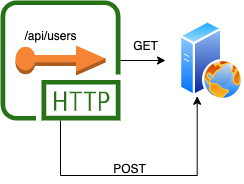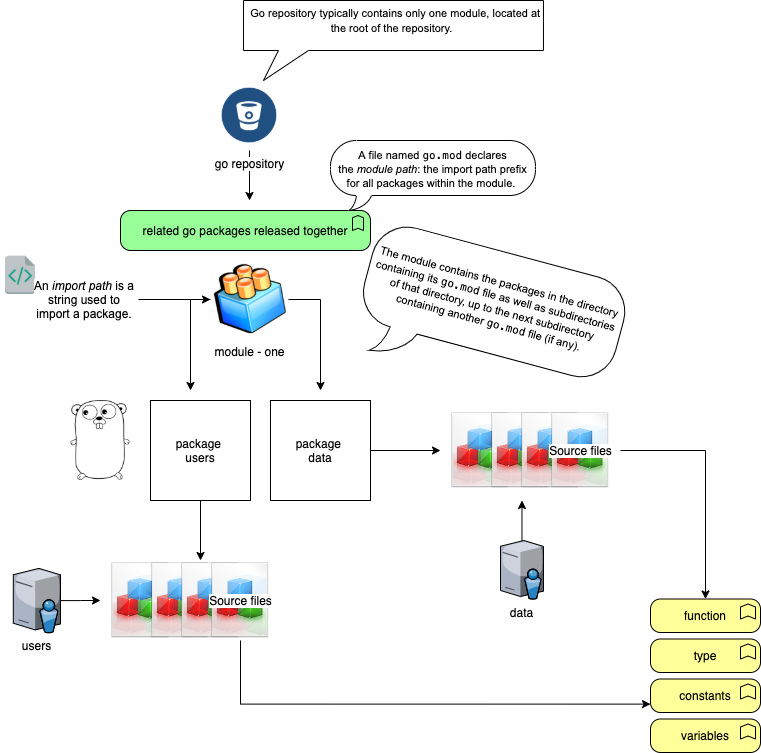Go: WebService [POST][GET]
GOLANG
Go is a powerful yet simple language. The nuances of assembling a workspace, sometimes are overwhelming, yet when it comes to simplicity it is very powerful.
In this blog, I will walk you through simple steps of writing a simple Webservice ‘/users‘ which will entertain GET & POST. It will respond to every other HTTP Method with a not supported error.

Entity: User
The web service will expose an object {User} or [{List of Users}]
Code Organization
Code packaging, Modules; is a tricky subject in Go. I learned from my mistakes, and even after you think you have got the hang of it, you still might get few surprises.

A module is a collection of packages in go that are stored in a file tree with a
go.modfile at its root.
Setting up the repository
Let’s create an empty directory gws in my home directory and create a directory src under it which should contain all the source code and sub-packages.
Please note the information I am assembling is available in multitudes of blogs which leverage the official go lang documentation & blogs (like this one).
Some considerations
- You don’t need to publish your code to a remote repository before you can build it.
- A module can be defined locally without belonging to a repository.
- An import path is a string used to import a package.
mkdir -p gws/src
cd gws/src
go mod init github.com/gwsI have a habit of creating
srcfolder, probably because of my maven days, but that is how I usually organize my code.
> cat go.mod
module github.com/gws
go 1.14Implementation
The main package is where the entry point for execution is defined.
user.go
This file stores the definition of the entity that will be exposed via the rest end point
package user
import "encoding/json"
//User Stores the information about a user
type User struct {
ID int `json:"id"`
Name string `json:"firstName"`
Middlename string `json:"middleName,omitempty"`
Surname string `json:"lastName"`
Email string `json:"userName"`
Address string `json:"address"`
}
//JSONUser marshal the User to a json structure
func JSONUser(user User) []byte {
b, err := json.Marshal(user)
if err != nil {
// Error while unmarshaling
return []byte("")
}
return b
}encoding/json
It exposes method Marshal and Unmarshal to do JSON translations in either direction.
The interface{} (empty interface) type describes an interface with zero methods. Every Go type implements at least zero methods and therefore satisfies the empty interface.
server.go
The server.go is created inside the /src folder.
package main
import (
"fmt"
)
// main Entry point for our code.
func main() {
fmt.Printf(" Webservice.\n")
}The outline of the web application is
- One end point called /api/users which will address GET and POST request for getting & adding a user respectively (defined as under)
user.data.go
This is a physical grouping of all functions that will provide interface to the available users for the server.
package user
import (
"encoding/json"
"fmt"
"io/ioutil"
"log"
"os"
"sort"
"sync"
)
// FileName filename
const FileName = "users.json"
// usersMap Stores the user information in memory.
var usersMap = struct {
sync.RWMutex
u map[int]User // map of users, which can be easily picked with the index
}{u: make(map[int]User)}
//init Initializes the usermap
func init() {
fmt.Println(" loading users....")
uM, err := loadUsersMap()
usersMap.u = uM
if err != nil {
log.Fatal(err)
}
log.Printf(" Loaded %d users...", len(usersMap.u))
}
// loadUsersMap Utility function to load the users from a file.
func loadUsersMap() (map[int]User, error) {
// os.Stat returns the FileInfo structure describing file.
if _, err := os.Stat(FileName); os.IsNotExist(err) {
return nil, fmt.Errorf("[%s] does not exist", FileName)
}
userList := make([]User, 0)
file, _ := ioutil.ReadFile(FileName)
// Unmarshal the data from the JSON file
err := json.Unmarshal([]byte(file), &userList)
if err != nil {
log.Fatal(err)
}
userMap := make(map[int]User)
// for i := 0; i < len(userList); i++ {
// userMap[userList[i].ID] = userList[i]
// }
for _, u := range userList {
userMap[u.ID] = u
}
return userMap, nil
}
// getUser Returns a user.
func getUser(i int) *User {
usersMap.RLock()
defer usersMap.RUnlock()
for user, ok := usersMap.u[i]; ok; {
return &user
}
return nil
}
//getUserList returns a user
func getUserList() []User {
usersMap.RLock()
defer usersMap.RUnlock()
users := make([]User, 0)
for _, value := range usersMap.u {
users = append(users, value)
}
return users
}
//getUserIDs Sort and return the ID's
func getUserIDs() []int {
usersMap.RLock()
userIds := []int{}
for key := range usersMap.u {
userIds = append(userIds, key)
}
usersMap.RUnlock()
sort.Ints(userIds)
return userIds
}
//getNextID returns the next available ID
func getNextID() int {
userIds := getUserIDs()
return userIds[len(userIds)-1] + 1
}
//addOrUpdateUser handles the POST or PUT request of add or update
func addOrUpdateUser(user User) (int, error) {
addOrUpdateID := -1
if user.ID > 0 {
oldUser := getUser(user.ID)
// if it exists, replace it, otherwise return error
if oldUser == nil {
return 0, fmt.Errorf("User-ID [%d] doesn't exist", user.ID)
}
addOrUpdateID = user.ID
} else {
addOrUpdateID = getNextID()
user.ID = addOrUpdateID
}
usersMap.Lock()
usersMap.u[addOrUpdateID] = user
usersMap.Unlock()
return addOrUpdateID, nil
}I am not using any database, so will be using in memory object to store few users that will respond appropriately to the HTTP methods when invoked.
// usersMap Stores the user information in memory.
var usersMap = struct {
sync.RWMutex
u map[int]User // map of users, which can be easily picked with the index
}{u: make(map[int]User)}user.service.go
It uses the “net/http” package which provides the client and the server configurations.
package user
import (
"encoding/json"
"fmt"
"io/ioutil"
"log"
"net/http"
"strconv"
"strings"
)
const userPath string = "users"
// SetupService Service end point
func SetupService(basePath string) {
// The HandlerFunc type is an adapter to allow the use of ordinary functions as HTTP handlers.
usersHandler := http.HandlerFunc(HandleUsers)
userHandler := http.HandlerFunc(HandleUser)
http.Handle(fmt.Sprintf("%s/%s", basePath, userPath), usersHandler)
http.Handle(fmt.Sprintf("%s/%s/", basePath, userPath), userHandler)
}
// HandleUsers Will expose this API to handle user commands
func HandleUsers(w http.ResponseWriter, r *http.Request) {
// Handlers can handle request with multiple request methods.
// Every request has a method a simple string
switch r.Method {
case http.MethodGet:
log.Println(" GET: called")
// Get the list of users.
users := getUserList()
//Marshal the userlist
b, err := json.Marshal(users)
if err != nil {
// Error while unmarshaling
w.WriteHeader(http.StatusInternalServerError)
return
}
w.WriteHeader(http.StatusOK)
w.Header().Add("Content-Type", "application/json")
w.Write(b)
case http.MethodPost:
log.Println(" POST: called")
var newUser User
e, er := ioutil.ReadAll(r.Body)
if er != nil {
w.WriteHeader(http.StatusBadRequest)
return
}
er = json.Unmarshal(e, &newUser)
if er != nil {
// Error unmarsheling the data
w.WriteHeader(http.StatusBadRequest)
}
fmt.Printf(" User : %s", newUser.Email)
_, err := addOrUpdateUser(newUser)
if err != nil {
log.Print(err)
w.WriteHeader(http.StatusBadRequest)
return
}
w.WriteHeader(http.StatusCreated)
w.Header().Add("Content-Type", "application/json")
w.Write(JSONUser(newUser))
case http.MethodOptions:
return
default:
log.Printf(" Method: %s\n", r.Method)
w.WriteHeader(http.StatusMethodNotAllowed)
w.Header().Add("Content-Type", "application/json")
w.Write([]byte("{msg: method not supported}"))
}
}
// HandleUser For a single user request
func HandleUser(w http.ResponseWriter, r *http.Request) {
// URL specifies either the URI being requested (for server
// requests) or the URL to access (for client requests).
urlPathSegments := strings.Split(r.URL.Path, fmt.Sprintf("%s/", userPath))
if len(urlPathSegments[1:]) > 1 {
w.WriteHeader(http.StatusBadRequest)
return
}
//Convert the last element of the slice (should be an int)
userID, err := strconv.Atoi(urlPathSegments[len(urlPathSegments)-1])
if err != nil {
log.Print(err)
w.WriteHeader(http.StatusNotFound)
return
}
//userID will be used in the switch below based on the HTTP method
switch r.Method {
case http.MethodGet:
user := getUser(userID)
if user == nil {
w.WriteHeader(http.StatusNotFound)
return
}
j, err := json.Marshal(user)
if err != nil {
log.Print(err)
w.WriteHeader(http.StatusBadRequest)
return
}
_, err = w.Write(j)
if err != nil {
log.Fatal(err)
}
case http.MethodPut:
var user User
err := json.NewDecoder(r.Body).Decode(&user)
if err != nil {
log.Print(err)
w.WriteHeader(http.StatusBadRequest)
return
}
if user.ID != userID {
w.WriteHeader(http.StatusBadRequest)
w.Write([]byte("{ msg: id supplied in request and in body mismatch}"))
return
}
_, err = addOrUpdateUser(user)
if err != nil {
log.Print(err)
w.WriteHeader(http.StatusBadRequest)
return
}
case http.MethodDelete:
//deleteUser(userID)
case http.MethodOptions:
return
default:
w.WriteHeader(http.StatusMethodNotAllowed)
}
}
Time to modify the server.go to use the /users service.
package main
import (
"fmt"
"log"
"net/http"
u "github.com/gws/user"
)
// PathAPI API path to be used as base
const PathAPI string = "/api"
// main Entry point for our code.
func main() {
fmt.Printf(" Webservice.\n")
//hell.SetupService(PathAPI)
u.SetupService(PathAPI)
log.Fatal(http.ListenAndServe(":8090", nil))
}
Points to remember
- Import the package user defined
import (
u "github.com/gws/user"
)- u.SetupService : It allows adding a base path for the endpoint exposed. In our example we are using ‘/api/users’
- http.ListenAndServer : It starts an HTTP server with a given address and handler. In our case the handler are setup in the SetupService method of package.
All the code is available in my gitrepo.
References
- https://golang.org/cmd/go/#hdr-Preliminary_module_support
- https://golang.org/pkg/sync/
- https://golang.org/pkg/sync/#RWMutex
- For more links visit here
